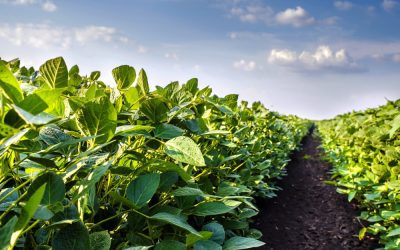California’s Low Carbon Fuel Standard restricts biofuel market opportunities
By Blair Shipp, American Soybean Association
As soybean harvest season kicks off and Congress returns from August recess, the American Soybean Association (ASA) is in full swing addressing critical policy issues. Just as farmers pour effort into their fields, ASA and its farmer leaders are equally dedicated to advocating for policies that will benefit the soybean industry.
From tackling California’s Low Carbon Fuel Standard (LCFS) to scrutinizing the EPA’s new herbicide regulations and pushing for better infrastructure funding in the Water Resources Development Act, ASA is working hard to ensure the policy landscape supports the success of U.S. soybeans.
California’s LCFS caps soybean use

On Aug. 26, ASA submitted detailed comments to the California Air Resources Board (CARB) regarding proposed modifications to its Low Carbon Fuel Standard. CARB, responsible for overseeing California’s low-carbon fuel policies, has proposed changes that could significantly impact the soybean industry.
The proposed modifications include a 20 percent cap on the use of soybean and canola oils for biofuels, a move ASA argues could severely restrict market opportunities for these biofuels. The proposals also involve new sustainability requirements and stricter carbon intensity thresholds.
ASA’s comments express concern that these changes lack scientific justification and could negatively affect both the environment and the soybean sector.
The LCFS program aims to reduce greenhouse gas emissions from transportation fuels by setting carbon intensity targets. While the updates are intended to further reduce emissions, ASA believes that the new measures may impose significant burdens on soybean oil and other biofuel feedstocks.
ASA’s feedback emphasizes the need for CARB to base its decisions on solid scientific evidence and to consider the potential economic impacts on the soybean industry.
EPA’s final ESA Herbicide Strategy
On Aug. 20, EPA released its final Endangered Species Act Herbicide Strategy, which addresses the impact of herbicides on endangered species. While ASA acknowledges some improvements from the initial proposal, the final strategy still poses challenges for soybean farmers.
ASA President Josh Gackle expressed concerns about the complexity of the new requirements, including runoff mitigations and spray drift buffers, which could increase costs and operational difficulties for farmers. The association has highlighted issues with the feasibility of these measures and their alignment with the best available science.
In addition, ASA and more than 300 other organizations have criticized the EPA’s approach to evaluating pesticide risks, arguing that it is overly conservative and imposes unnecessary restrictions. ASA remains committed to working with the EPA to ensure that the ESA Herbicide Strategy is effective in protecting endangered species while remaining practical for agricultural use.
Senate cost-share ratio in WRDA legislation
With Congress back in session, ASA is actively advocating for the Senate-passed cost-share ratio in the 2024 Water Resources Development Act.
The Senate bill proposes a cost-share ratio of 75 percent general revenue and 25 percent Inland Waterways Trust Fund for inland waterways projects, compared to the House bill’s ratio of 65 percent general revenue and 35 percent IWTF.
This proposed change is crucial for improving the efficiency and timeliness of construction projects on the U.S. inland waterways system, which is vital for transporting soybeans and other commodities.
ASA’s advocacy aims to ensure that the Senate-passed ratio is included in the final WRDA legislation, which is expected to be reconciled by the end of the year.
ASA pushes for farm bill
From Sept. 10-11, ASA Vice President Caleb Ragland, a farmer from Kentucky and Directors Ronnie Russell of Missouri, Heather Feuerstein of Michigan, Jamie Beyer of Minnesota and Justin Sherlock of North Dakota participated in a farm bill fly-in in Washington, D.C.
This event gathered farmers and representatives from various agricultural organizations to advocate for the passage of the 2024 Farm Bill.
Prior to the event, ASA and more than 300 national and state groups, including the Indiana Soybean Alliance, sent a letter to congressional leaders urging them to pass the farm bill before the end of the year. The letter, supported by various commodity groups, lenders, and stakeholders across the agricultural sector, emphasized the critical need for a robust farm safety net to support farmers facing worsening economic conditions.
The letter stressed that many producers are struggling with declining crop prices, which have dropped by an average of 21 percent this year, while production costs remain high. It called attention to the financial challenges farmers face, including difficulties in securing operating credit for the 2025 crop year. This backdrop of economic strain underscores the importance of updating the farm bill to address current and future needs.
The fly-in provided a platform for farmers and stakeholders to discuss these issues directly with lawmakers. The goal was to advocate for a farm bill that effectively addresses the economic difficulties faced by farmers, including volatile market prices and high production costs.
ASA is grateful for the support of state soybean organizations, such as the Indiana Soybean Alliance, in this advocacy effort. Their participation in signing the letter and their ongoing engagement in policy discussions are vital in pushing for legislative changes that benefit U.S. soybean farmers and strengthen the agricultural sector’s resilience.
As ASA continues to work with Congress and other stakeholders, the focus remains on ensuring that the farm bill provides the necessary support and updates to meet the evolving needs of farmers and the agricultural community.
Posted: September 18, 2024
Category: Indiana Corn and Soybean Post - September 2024, ISA M&P, News




